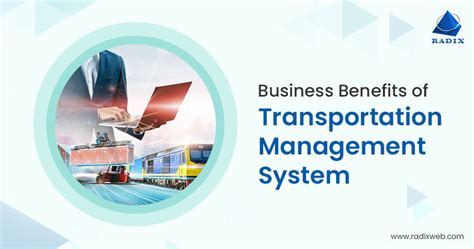The transportation industry is undergoing a significant transformation, driven by advances in technology and changing consumer demands. At the forefront of this revolution is Transportation Management Systems (TMS) technology, which is revolutionizing the way goods are moved, stored, and delivered. In this article, we will explore five ways TMS technology is transforming the transportation management landscape.
The Importance of Efficient Transportation Management
Transportation is a critical component of any business that involves the movement of goods. However, the complexity of managing multiple transportation modes, routes, and carriers can be overwhelming. Inefficient transportation management can lead to increased costs, reduced customer satisfaction, and a competitive disadvantage. This is where TMS technology comes in – to streamline transportation operations, reduce costs, and improve overall efficiency.
1. Enhanced Visibility and Tracking
One of the primary benefits of TMS technology is enhanced visibility and tracking. With a TMS, shippers and carriers can track shipments in real-time, receive updates on delivery status, and access detailed analytics on transportation performance. This increased visibility enables businesses to make data-driven decisions, optimize routes, and improve on-time delivery rates.
2. Automated Freight Auditing and Payment
TMS technology also automates freight auditing and payment processes, reducing manual errors and increasing efficiency. With a TMS, businesses can automatically verify freight charges, identify discrepancies, and process payments. This automation enables businesses to reduce transportation costs, improve cash flow, and focus on core activities.
Benefits of Automated Freight Auditing and Payment
• Reduced manual errors and discrepancies • Improved cash flow and reduced transportation costs • Increased efficiency and productivity
3. Optimized Routing and Carrier Selection
TMS technology enables businesses to optimize routing and carrier selection, reducing transportation costs and improving delivery times. With a TMS, businesses can analyze transportation data, identify optimal routes, and select the best carrier for each shipment. This optimization enables businesses to reduce mileage, lower emissions, and improve overall transportation efficiency.

4. Improved Collaboration and Communication
TMS technology also improves collaboration and communication between shippers, carriers, and other stakeholders. With a TMS, businesses can share transportation data, track shipments in real-time, and communicate with carriers and other stakeholders. This improved collaboration enables businesses to respond to disruptions, resolve issues quickly, and improve overall transportation performance.
Benefits of Improved Collaboration and Communication
• Improved responsiveness to disruptions and issues • Reduced errors and improved accuracy • Increased trust and cooperation between stakeholders
5. Data-Driven Decision Making
Finally, TMS technology enables businesses to make data-driven decisions about transportation operations. With a TMS, businesses can access detailed analytics on transportation performance, identify trends and patterns, and make informed decisions about transportation strategy. This data-driven approach enables businesses to reduce costs, improve efficiency, and optimize transportation operations.

Gallery of TMS Technology in Action




Frequently Asked Questions
What is Transportation Management Systems (TMS) technology?
+TMS technology is a software solution that enables businesses to manage and optimize their transportation operations, including routing, carrier selection, and freight auditing.
How does TMS technology improve transportation efficiency?
+TMS technology improves transportation efficiency by automating manual processes, optimizing routes and carrier selection, and providing real-time visibility and tracking.
What are the benefits of using TMS technology?
+The benefits of using TMS technology include reduced transportation costs, improved delivery times, and increased efficiency and productivity.
In conclusion, TMS technology is revolutionizing the transportation management landscape by providing enhanced visibility and tracking, automated freight auditing and payment, optimized routing and carrier selection, improved collaboration and communication, and data-driven decision making. By leveraging these benefits, businesses can reduce costs, improve efficiency, and optimize transportation operations.
